
Top Fruit to Try in Indonesia: Exotic Flavors Await
 December 24
December 24
 17 min read
17 min read
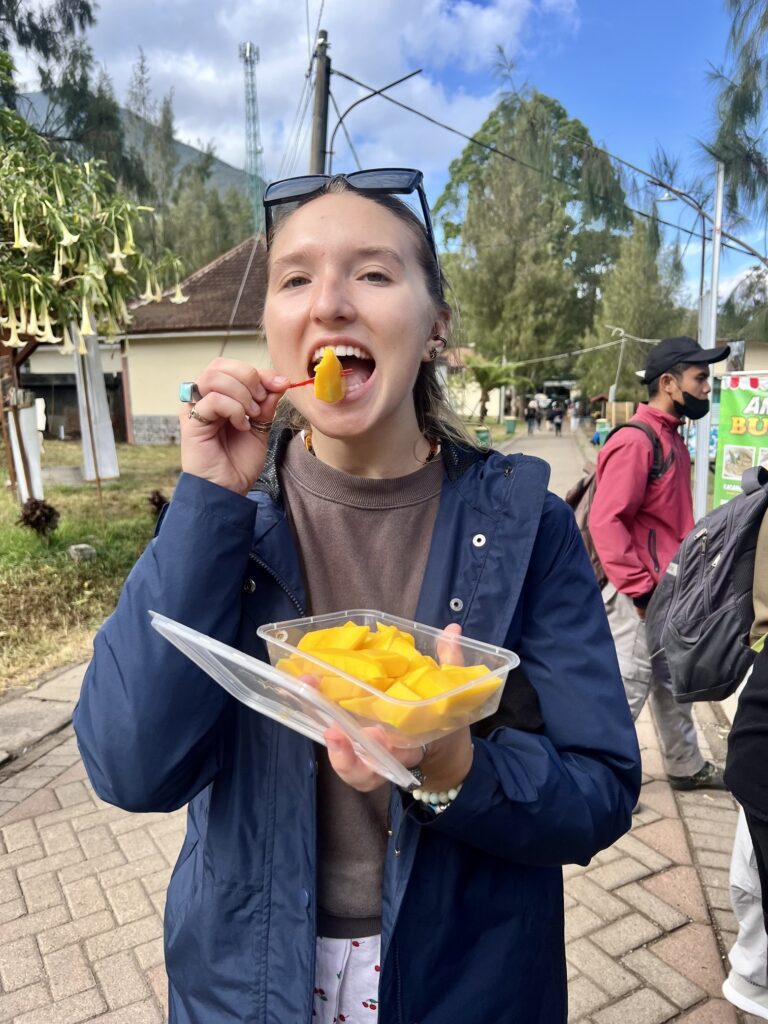
Fruit to Try in Indonesia-Key Highlights
- Discover the diverse world of Indonesian fruits, from the pungent durian to the sweet mangosteen with this list of fruit to try in Indonesia.
- Learn about unique varieties like snake fruit and rose apple that will tantalize your taste buds.
- Find out the best time to enjoy each fruit with a handy seasonal guide.
- Get tips on selecting and storing Indonesian fruits to maximize freshness and flavor.
- Explore the best local markets where you can find the most delicious and exotic Indonesian fruits.
Introduction
Get ready to go on a fun journey into the tasty world of Indonesian fruits. Southeast Asia has a warm climate that is perfect for growing fruit. Indonesia is special because it has many unique and exotic fruits. Be prepared to enjoy new flavors and textures that you have never tried before, especially if it’s your first time. From the well-known durian to the less popular snake fruit, Indonesia’s collection of fruits is full of exciting and tasty surprises. Explore this list of the top fruit to try in Indonesia during your visit!
Exotic Indonesian Fruits You Must Try
Indonesia is a place full of lively culture and beautiful scenery. It is also great for those who love fruit. With its warm weather, Indonesia has many exotic fruits that are tasty and look good too. When you visit busy local markets or walk through green plantations, don’t forget to try the special flavors waiting for you.
There are many fruits to enjoy in Indonesia, from the strong-smelling durian to the sweet mangosteen. In this varied group of islands, you’ll even find unique fruits like rambutan, which has a furry outside, and starfruit, which looks as good as it tastes.
1. Durian – Indonesia’s National Fruit
No look at Indonesian fruits is complete without the “King of Fruits” – the durian. This fruit is famous in Southeast Asia for its strong smell and unusual taste. Tasting durian is something you’ll remember long after you finish it.
Durian is hard to miss because of its large, spiky skin and a scent people often say is like sweet onions mixed with gym socks. Whether you love it or hate it, the smell of durian is hard to forget. But don’t let the strong scent scare you away. Inside the tough shell, you will find creamy, custard-like flesh. It has a sweet, slightly fermented taste.
The best time to eat durian is when it is fresh and ripe. Many people use it in desserts, ice cream, and even some savory dishes. In Indonesia, durian stands for national pride and is a must-try for anyone who enjoys trying new foods.
2. Mangosteen – The Queen of Fruits
Standing in sharp contrast to the strong smell of durian is the mangosteen, often called the “Queen of Fruits.” Its dark purple skin hides sweet and tangy pieces that are a joy to eat.
People love mangosteen not just for its great taste but also for its health benefits. It is full of antioxidants and vitamins. Many believe that mangosteen helps boost immunity and keeps skin healthy. Peeling a mangosteen takes some skill.
The thick skin needs gentle pressure to crack open, which shows the clean, white pieces inside. Each bite releases delicious, tangy juice, making mangosteen a very refreshing snack.
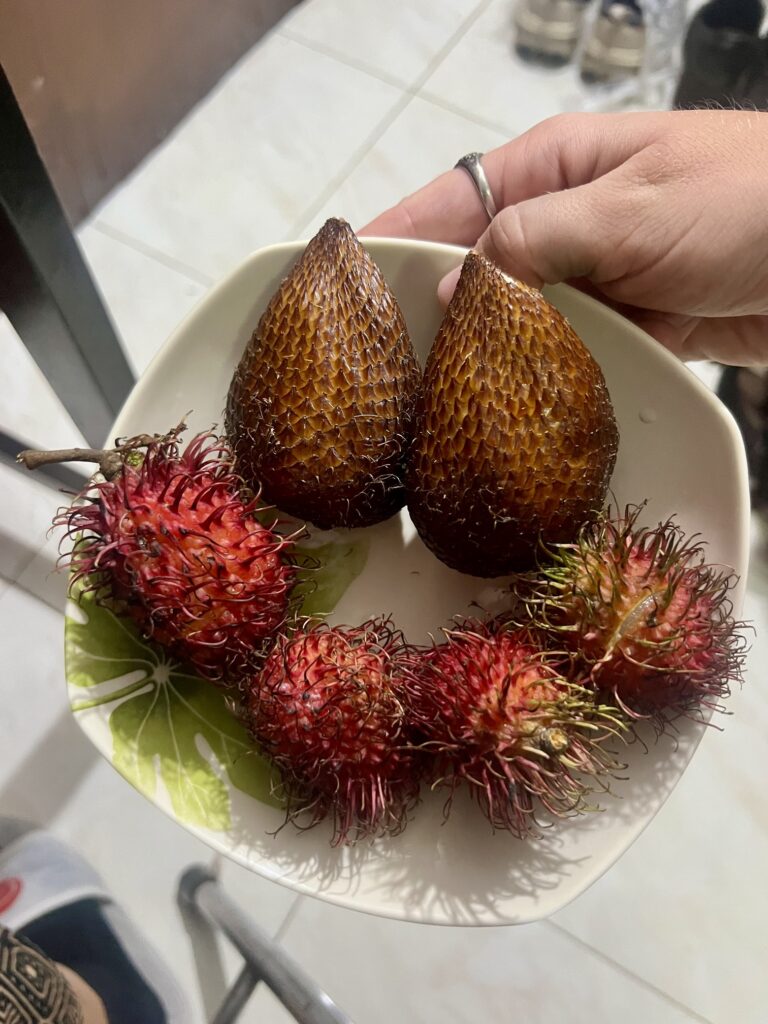
3. Rambutan – A Juicy Delight
Covered in soft, spiky hairs, the rambutan might look a little scary at first. But don’t let that trick you. This unique fruit is a true treasure, hiding sweet and juicy goodness under its strange skin.
Rambutan comes from Southeast Asia and is a good source of vitamin C. It is loved for its cool and refreshing taste. The fruit’s name comes from a Malay word that means “hair,” which fits its look very well. To enjoy the juicy fruit inside, just peel off the hairy outer layer. This will show you the clear, white meat.
The flavor of rambutan is a lovely mix of sweetness and a little tartness. Its texture is like a grape, making it a fun and tasty snack.
4. Salak – The Snakeskin Fruit
The salak, known as “snake fruit,” has scaly, reddish-brown skin. It comes from Indonesia and is exciting to look at and taste. When you hold a salak, it feels special, like a treasure from a dragon. Its unique look and flavor, alongside other tropical fruits like langsat, create a fun eating experience.
To eat a salak, first peel off the rough skin. Once you do this, you’ll find a pale, crunchy inside. It tastes sweet, tangy, and a little bit sour. Some people think it tastes like pineapple, pear, and even hazelnut.
People often eat salak fresh as a snack. Its crunchy texture is a nice touch in fruit salads. Plus, it is a good source of fiber and antioxidants. This makes salak both tasty and a healthy choice.
5. Jackfruit – A Tropical Bounty
The jackfruit is hard to miss. Native to South Asia, it is one of the biggest fruits in the world, weighing up to 80 pounds. This impressive fruit is a key part of Southeast Asian cooking. People love it for its different uses and unique taste.
Jackfruit is now very popular as a meat alternative in vegan and vegetarian meals. Its stringy texture feels like pulled pork. The fruit’s sweet taste makes it great for desserts and smoothies too. The smell is a mix of pineapple and banana, which is just as unique as its size.
To prepare a jackfruit, you must first get through its spiky outside. Inside, you will find many pods, each with sweet, soft fruit and a big seed. While many people enjoy the fruit fresh, it can also be cooked. This adds a special flavor and texture to dishes like curries and stir-fries.
Discover Unique Flavors
Indonesia is not just home to popular fruits like durian, mangosteen, rambutan, and jackfruit. It has many lesser-known fruits that are also very appealing. These exotic fruits can surprise your taste buds and make you want more.
If you explore beyond the usual choices, you can find the sour taste of soursop, the tropical sweetness of papaya, and the unique star-shaped starfruit, as well as the delightful sawo kecik. Each fruit has its own story. They show Indonesia’s rich food culture and the amazing variety of its tropical fruits. Here’s more fruit to try in Indonesia.
6. Soursop – A Natural Dessert
Soursop has a spiky green outside. It may not seem very inviting at first. But inside, it has a creamy, white flesh. This flesh is both tart and sweet, making it a yummy treat.
Soursop has a tangy, slightly sour taste. It reminds people of citrus fruits like pineapple and lemon. This is balanced with a gentle sweetness. The texture is smooth and soft, which is great for eating alone or adding to drinks. Soursop is very flexible and can be enjoyed in many ways, and it may also have potential for medicinal purposes.
Many people like to eat it fresh by scooping out the flesh and enjoying its unique taste. Others like to mix it into smoothies, juices, or ice cream. Its tartness adds a fun twist to these treats.
7. Papaya – The Sunshine Fruit
The papaya has bright orange fruit and a sweet smell that reminds people of sunshine and warm places. It’s a big part of Indonesian food, thanks to its great taste and health benefits.
Papayas provide a lot of vitamin C, which helps the immune system. They also have antioxidants and fiber. This makes papaya a healthy and tasty choice for your meals. You can enjoy papaya in many ways.
Some people like to eat it fresh by cutting it up and enjoying its sweetness. Others make smoothies, mix it into juice, or include it in savory dishes.
8. Starfruit – A Star-Shaped Wonder
The starfruit, named for its star shape when cut, is a fruit that looks great and tastes amazing. This fruit comes from Southeast Asia, including Sri Lanka, and brings a fun touch and a refreshing flavor to any fruit platter.
Its flavor is a special mix of sweet and tangy, with a hint of citrus and apple. Some types are sweeter, while others taste more tangy. Rich in vitamin C and antioxidants, starfruit is tasty and good for your health.
Starfruit is very flexible and can be eaten in many ways. You can enjoy it fresh, put it in salads, use it as a decoration for desserts or drinks, or even cook it into jams and preserves.
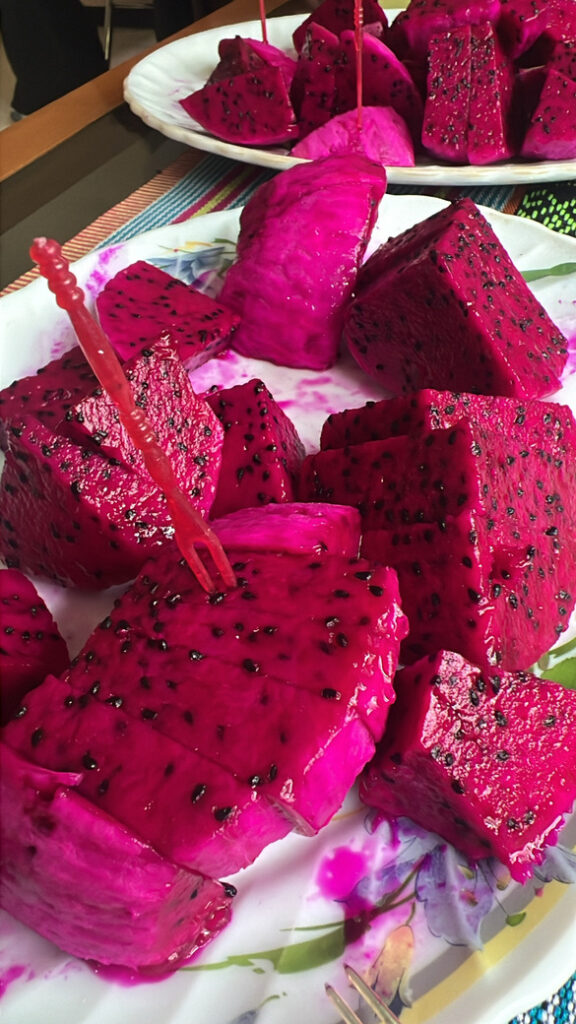
9. Dragon Fruit – A Vibrant Treat
The dragon fruit, with its bright pink or yellow skin and green scales, is a beautiful and exotic fruit. It comes from Central America and South America but is now grown a lot in Southeast Asia. This shows how rich Indonesia’s biodiversity is.
The inside of the fruit can be white or a deep magenta. Both types have tiny, crunchy black seeds that you can eat. Even though it looks like it would taste strong, dragon fruit is actually very mild. It has a slightly sweet and refreshing flavor.
People often eat dragon fruit fresh. They slice it up to eat on its own or mix it into fruit salads. Its bright color and unique look make it a favorite in smoothies, cocktails, and fruit platters.
10. Banana – The Versatile Fruit
The banana, while not as unique as some other fruits in Indonesia, has an important role in the food culture of the country. This common fruit is loved for its many uses and health benefits. People of all ages enjoy bananas.
In Indonesia, there are many types of bananas, each with its own taste and feel. Some bananas are great when eaten fresh. Others are better when cooked or used in savory meals. Bananas are rich in potassium, fiber, and vitamins, making them a tasty and healthy snack or part of a meal.
Bananas are key to Indonesian cooking. You can find the sweet, small pisang mas and the bigger, starchier plantains that are used in savory dishes. People eat them fresh, fried, grilled, boiled, or even in desserts like banana fritters and banana pancakes.
Tropical Delights to Savor
Indonesia has so many tasty tropical fruits for you to enjoy, including manggis. Besides the fruits I just got done talking about, there are still more to discover. You can enjoy the sweet and tangy pineapple. Don’t forget the juicy and refreshing mangoes. Your fruit adventure in Indonesia is just getting started.
You will love the creamy texture of coconut. The pomelo adds a nice burst of citrus. The passion fruit will surprise you with its unique taste. Each fruit gives you a special mix of flavors and textures. Together, they show off the rich and diverse nature of Indonesian food.
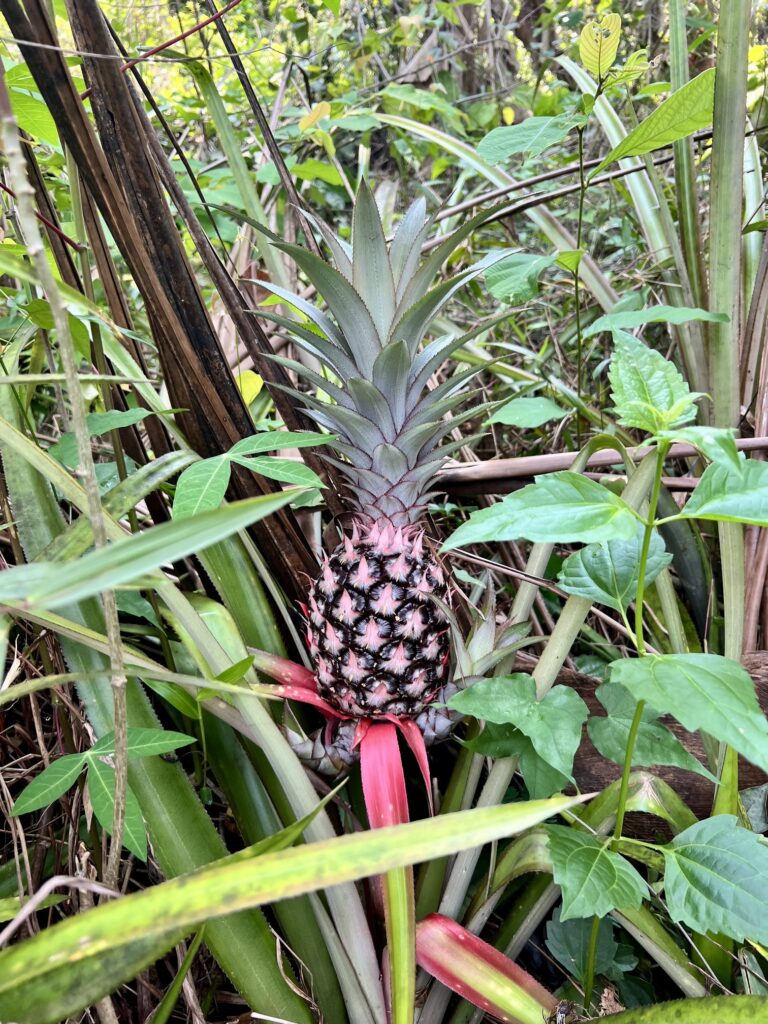
11. Pineapple – An Island Favorite
No trip to a tropical paradise is complete without tasting the sweet, juicy flavor of a ripe pineapple. In Indonesia, pineapples are very special because the country has many unique types that people love for their taste.
One of the most well-known types is called ‘Nanas Palembang.’ It gets its name from Palembang, a city of South Sumatra, where it grows well. This kind of pineapple, from the city of South Sumatra, is small, very sweet, and has low acidity.
You can enjoy pineapples in many ways. Many people like to eat it fresh, either sliced or in chunks. Others prefer it in tasty juices or smoothies. Pineapple is also a favorite in desserts. It adds a sweet and tangy flavor to cakes, tarts, and ice cream.
12. Mango – The King of Tropical Fruits
The mango is often called the “King of Tropical Fruits.” In Indonesia, this edible fruit is very popular. Its sweet smell and juicy flesh are found everywhere in different meals. Mango appears in street food and fine dining. It delights people’s taste buds with its rich flavor.
Indonesia has many types of mangoes. Each type has its own taste, smell, and feel. Some, like the ‘Harum Manis’ mango, are loved for their sweetness. Others have a mix of sweet and tart flavors.
Mangoes taste great and have health benefits too. They are full of vitamins, minerals, and antioxidants. Eating mango can help boost immunity, aid in digestion, and support overall health and well-being.
13. Coconut – Refreshing and Nutritious
The coconut is a key part of Indonesian food and culture. It represents the richness of tropical areas. Coconuts provide many uses and health benefits.
In Indonesia, street sellers cut open young coconuts. They serve the sweet, hydrating water right from the coconut. This water has electrolytes that help refresh the body.
The flesh of mature coconuts, whether fresh or dried, has many uses. People grate it for desserts and squeeze it to make rich milk. It adds flavor to curries and can even be made into oil for cooking and beauty.
14. Pomelo – A Citrus Giant
The pomelo is a large citrus fruit found in Indonesian markets. Its size and thick skin suggest that it holds juicy goodness inside. Pomelos are much like grapefruits, but they tend to be sweeter and have a lighter bitterness.
Inside, the fruit has segments covered by thick white pith which give a burst of refreshing and tangy flavor. Pomelos are high in vitamin C and antioxidants, making them a tasty and healthy snack.
In Indonesia, people enjoy eating pomelos fresh. They often peel and segment them for easy eating. The juice from pomelos is also popular. People like to drink it by itself or mix it into cocktails for a fruity twist.
15. Passion Fruit – A Tangy Surprise
The passion fruit has wrinkly purple or yellow skin. It may not seem impressive at first, but inside, it offers a tangy surprise that can wake up your taste buds. This tropical fruit is famous for its strong smell and juicy pulp filled with crunchy seeds. It has a special mix of sweet and sour flavors.
Passion fruit is high in vitamin C and antioxidants, making it a healthy and refreshing snack. In Indonesia, people enjoy it fresh, while the unripe fruit is often used in various traditional dishes. They scoop out the pulp and savor its unique taste.
The tangy juice from passion fruit is also used to add flavor to drinks, desserts, and even some savory sauces. This gives a bright twist to many dishes.
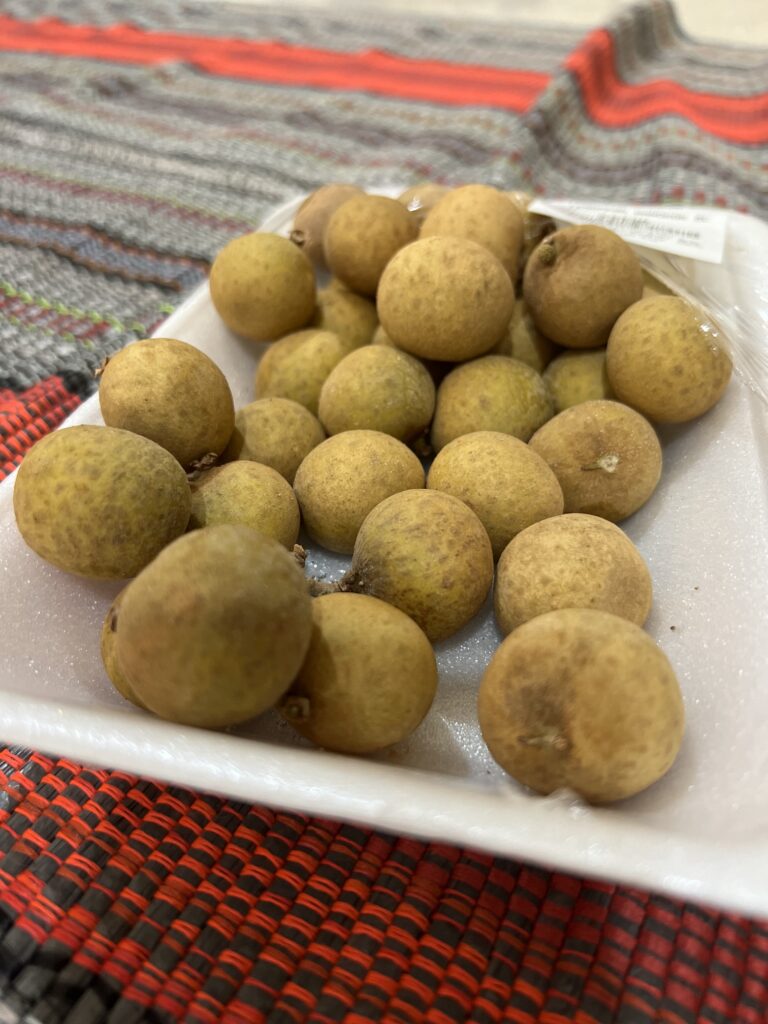
16. Lychee – Pearl Fruit
The lychee is often called the “pearl fruit” because it has pearly white flesh. This fruit is loved for its sweet smell and refreshing taste. It comes from Southern China but is also grown a lot in Southeast Asia. Additionally, people enjoy lychees fresh for their potential benefits, including support for weight loss, and use them in many types of dishes.
Lychees have a light, sweet taste that makes them special and hard to resist. The fruit is soft and juicy, perfect for eating on a hot day. It’s best to eat lychees fresh.
To eat one, just peel off the bumpy, reddish-brown skin. This reveals the clear, white flesh inside. Put a lychee in your mouth and enjoy its sweet, floral taste as the juice fills your mouth.
How to Select and Store Indonesian Fruits
When you choose Indonesian fruits, pick ones that are full, colorful, and smooth. Smelling the fruit helps, too, because many fruits smell nice when they are ripe. For fruits like durian and mangosteen, gently pressing the skin can show if they are ready to eat.
Keep ripe fruits at room temperature until you want to eat them. You can put fruits like mangosteen and rambutan in the fridge for a few days to keep them fresh. Don’t store fruits together that might change each other’s taste, like durian and bananas.
Sampling Indonesian Fruits: Best Local Markets
One of the best ways to enjoy the fruits of Indonesia is to go to local markets. These busy places have a lot of fresh fruit. The vendors are happy to share their knowledge and help you pick the best fruit.
Local markets are lively and exciting. You will see bright colors, smell amazing scents, and hear friendly talks from both vendors and shoppers. There will be piles of unique fruits that you may not know. This is a chance to try new things in your cooking.
Feel free to ask vendors for a taste. Many will let you try some fruit before you buy it. This is a great way to find your new favorites and really enjoy the flavors of Indonesia.
Seasonal Guide to Indonesian Fruits
Indonesian fruits are best enjoyed when they are in season, as this is when their flavor is at its peak. Use this handy guide to find out when to look for your favorite fruits:
| Fruit | Season |
| Durian | October – February |
| Mango | June – December |
| Mangosteen | December – March |
| Rambutan | September – April |
| Salak | Year-round |
| Jackfruit | May – September |
| Soursop | June – September |
| Papaya | Year-round |
| Starfruit | Year-round |
| Dragon Fruit | December – May |
| Pineapple | Year-round |
| Coconut | Year-round |
| Pomelo | Year-round |
| Passion Fruit | Year-round |
| Lychee | June – August |
Keep in mind that these seasons are approximate and may vary depending on the region and specific weather conditions. Visiting local markets is always the best way to find out what’s in season and at its peak of flavor.minerals that are key for good health. Also, traditional Indonesian cooking often uses grilling or steaming. This keeps the food healthy and its nutrients intact. Adding the rich flavors of Indonesian cuisine to your meals can be both delicious and nutritious.
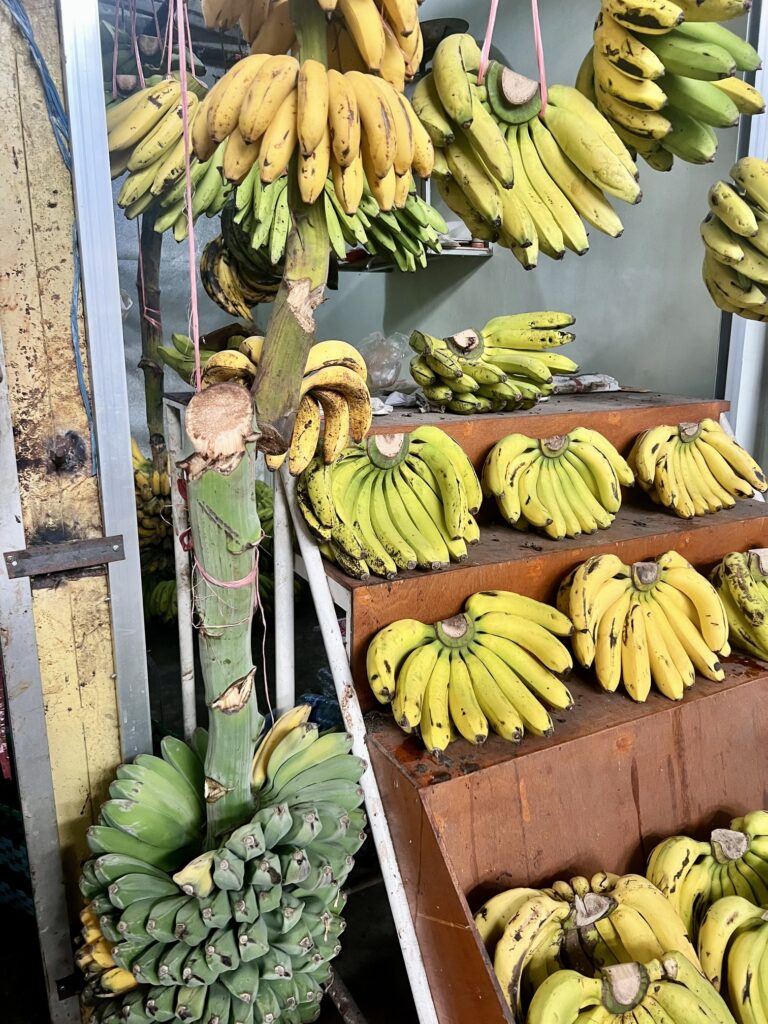
Conclusion
Indonesia has many delicious exotic fruits for you to enjoy. You can find famous fruits like Durian and the tropical Jackfruit in grocery stores. Each fruit has its own story of Indonesia’s rich flavors. You can experience the tangy Passion Fruit or the refreshing Coconut. Every bite takes you on a culinary adventure. To taste these tropical treats, visit the best local markets in Indonesia. You will see bright colors and bold flavors in the fruits. Add some exotic taste to your meals. Start your tasty journey today and enjoy the tropical wonders that Indonesia brings!
Planning a visit to Indonesia? Check out my complete travel guide!
Fruit to Try in Indonesia- Frequently Asked Questions
What is Indonesia’s National Fruit?
Durian is known for its special taste and strong smell. It is the national fruit of Indonesia. This fruit is a source of pride for the country. Anyone visiting Indonesia should try it. However, be careful; its strong smell is not for those who are faint of heart!
How Do You Eat a Rambutan?
Rambutan is a tasty tropical fruit that is simple to eat with very little effort. All you need to do is make a small cut in the hairy outer skin with your fingernail or a small knife. Then, peel it off to get to the juicy white fruit inside. Be careful to not eat the seed in the middle, and enjoy the sweet and slightly tangy taste.
Can You Eat Salak Skin?
The salak fruit, often called snake fruit because of its scaly skin, has tasty flesh inside. However, do not eat the skin. Just peel it off to enjoy the crunchy and tangy segments inside.
What Makes Mangosteen Unique?
Mangosteen is often called the “Queen of Fruits.” It has a special flavor that is sweet and a bit tangy, especially from the center of the fruit. This fruit is not only tasty but also has many health benefits. Its tropical sweetness and pretty look make it stand out.
What Fruit is Popular in Bali?
Bali has a warm climate that helps many fruits grow. You can find popular fruits like mangosteen, dragon fruit, and rambutan. There are also local fruits you should try, such as snake fruit, known as salak, and wax jambu, which is also called water apple and mountain apple.
Related Posts
Explore Yosemite National Park: A Nature Lover’s Paradise
Key Highlights Next, let’s dive into what makes Yosemite National Park an unmatched treasure of the United…
Local Favorites: What Food to Eat in California
Key Highlights Introduction California, also called the golden state, is a great place for people who love…
Discover the 20 Best Places to Visit in California Now
Key Highlights Introduction California is a place that has something for everyone. You can find natural beauty…




